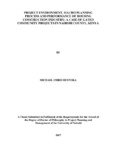| dc.description.abstract | The study examined project environment, macro planning process and performance of housing construction industry: A case of gated community projects in Nairobi County, Kenya. The study was guided by six objectives which sought to establish the extent to which each of the independent variables namely; regulatory environment, technological environment, and project manager‘s personal attributes related to project performance. Further the environment factors combined were tested to establish their relationship with project performance. Macro planning process was tested to establish its influence on project performance, and further, was examined to determine its moderating influence on the relationship between project environment and performance. Six research hypotheses related to the objectives were tested to shed light on the direction of the study. Literature review was based on what other scholars, academicians, and practitioners in the field under study had said based on the study variables. Pragmatic paradigm to support mixed mode approach was adopted. Cross sectional descriptive survey and correlational research designs were used in this study. The study population comprised of 406 gated community housing projects initiated in 2009 – 2014. A total of 572 respondents were drawn from 143 sampled gated community housing projects from the seventeen sub-counties of Nairobi County (four members were drawn from each sampled gated community project – client, consultant, contractor, and the gated community facility manager). The sample was drawn from 208 gated community projects which were active. The sampling technique combined census, stratified, simple random, and purposive sampling techniques. A standardized open-ended interview guide and a Questionnaire with both open and closed-ended items with Likert-type interval scale anchored on a five-point scale were used to collect data. Descriptive statistics were computed for all variables using frequencies, percentages, arithmetic mean and standard deviation. Statistical tools used for inferential statistic were Pearson‘s Product Moment Correlation (r), simple regression, multiple regression and stepwise regression ( ). T-tests were used to test hypotheses in the study. The results revealed that: r=0.532, t =4.314 at p=0.000<0.05, 1. was confirmed and concluded that regulatory environment had a statistically significant influence on the performance of gated community projects in Nairobi County, Kenya; with r=0.559, t =4.578 at p=0.000<0.05, 2. was confirmed and concluded that technological environment had a statistically significant influence on the performance of gated community projects in Nairobi County, Kenya; with r=0.539, t =5.074 at p=0.000<0.05, 3. was confirmed and concluded that project manager‘s personal attributes had a statistically significant influence on the performance of gated community projects in Nairobi County, Kenya; With r=0.655, t =10.962 at p=0.000<0.05, 4. was confirmed and concluded that macro planning process had a statistically significant influence on the performance of gated community projects in Nairobi County, Kenya; With r=0.655, t =39.273 at p=0.000<0.05, 5. was confirmed and concluded that combined environment variables (project environment) had a statistically significant influence on the performance of gated community projects in Nairobi County, Kenya; and with =0.587, R2Δ=0.039, t = 15.15, p=0.000<0.05, 6. was confirmed and concluded that the
xviii
relationship between project environment and performance of gated community projects in Nairobi County, Kenya is moderated by the project macro planning process. The study highlighted the need for project planners, managers and other stakeholder‘s training on new project technologies and provision of adequate ICT infrastructure for effective performance of the projects. The study deviated from other studies by empirically showing how individual project environment factors influenced the performance of gated community projects in Nairobi County, Kenya. The study recommended further research to be conducted with the project environment as the moderator to the relationship between macro planning process and project performance. Further, replication of this study may be done in all the counties in Kenya for further analysis and comparison. | en_US |



